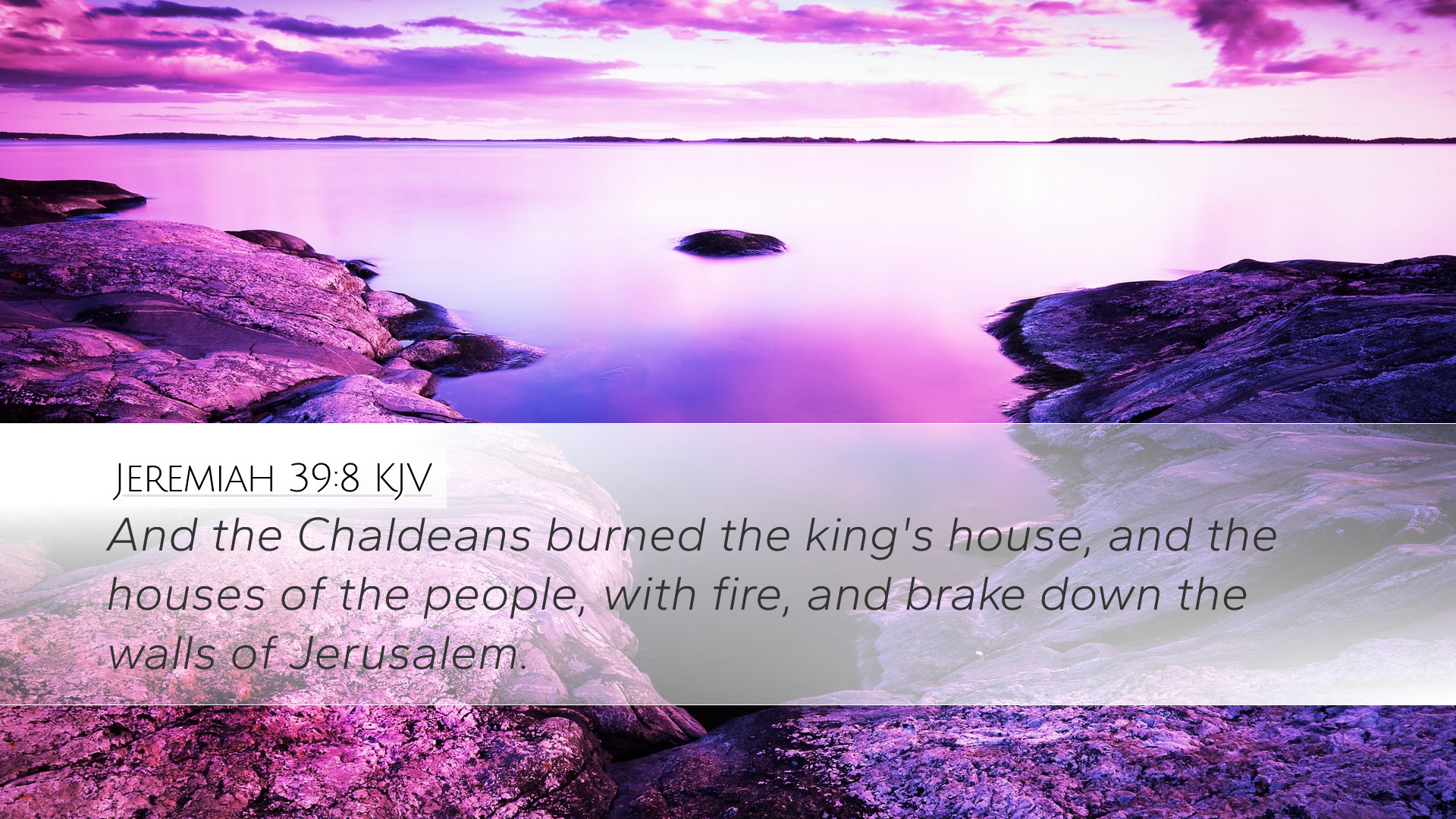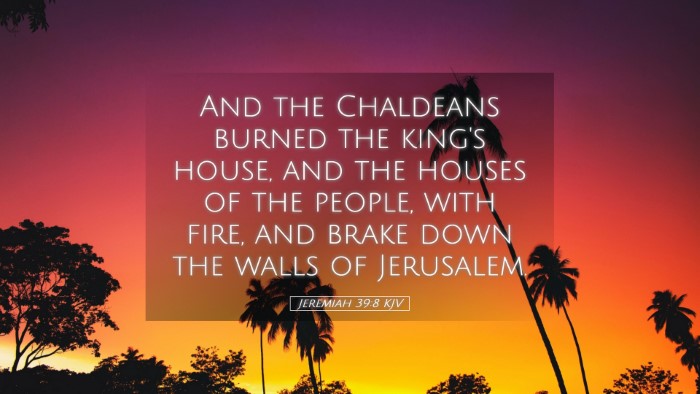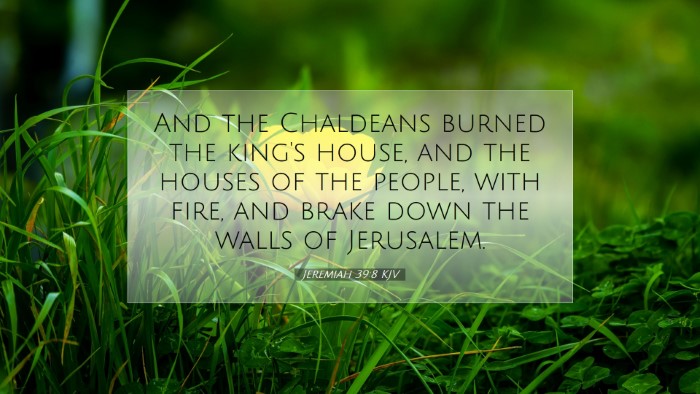Commentary on Jeremiah 39:8
Jeremiah 39:8 states: "And the Chaldeans burned the king's house, and the houses of the people, with fire, and broke down the walls of Jerusalem." This verse presents a poignant moment in the narrative of the fall of Jerusalem and serves as a significant reference point for understanding God's judgments, the impacts of sin, and the historical context of the Israelite people.
Contextual Overview
Jeremiah's prophecies consistently warn of impending judgment against Jerusalem and its inhabitants due to their disobedience and idolatry. This chapter specifically highlights the culmination of those prophecies during the siege by the Chaldeans, wherein they executed God's foretold judgment upon the city.
Insights from Matthew Henry
According to Matthew Henry, this verse signifies the complete destruction of what once held significance for the people of Israel—namely, their king's house and the homes of the populace. Henry notes that the burning of the king's house symbolizes the destruction of authority and leadership among the Israelites. Moreover, the fire reflects not only physical destruction but also the spiritual desolation that resulted from rejecting divine guidance.
The Symbolism of Fire
The metaphor of fire is significant throughout the Scriptures. In this context, Henry observes that it indicates purification through judgment. The homes of the people, much like the temple and their leaders, failed to uphold fidelity to God’s covenant. The devastation wrought by the Chaldeans thus serves as a divine indictment that underscores that sin has dire consequences.
Insights from Albert Barnes
Albert Barnes provides an analytical perspective on the actions taken by the Chaldeans. He identifies the strategic intent behind the destruction: to demoralize the surviving inhabitants and obliterate any possibility of a resurgence of resistance. The dismantling of the walls symbolizes a complete capitulation of not just physical security but also the previous existential identity of Jerusalem as God’s chosen city.
National Identity and Displacement
Barnes further elaborates on the implications of such devastation, highlighting how the destruction of homes signals the loss of a sense of belonging for the Israelites. The burning and breaking down are tantamount not only to the loss of property but also to the obliteration of the cultural and national identity that the Israelites held dear. This resonates with contemporary themes of exile and the pain of losing one’s heritage.
Insights from Adam Clarke
Adam Clarke's analysis goes into the theological implications of this verse. He emphasizes that the judgment executed by the Chaldeans was not merely an act of war but rather a fulfillment of God’s promises and warnings communicated through the prophets. Clarke posits that God permitted this destruction as a way to lead His people back into a recognition of their transgressions and ultimately to repentance.
The Role of Divine Sovereignty
Clarke points out the tension between God's sovereignty and human action. While the Chaldeans acted as instruments of judgment, it remains essential to recognize that God’s overarching plan is at play. He uses various means to bring about justice, highlighting the complexities of divine governance and the motivations of individuals within a historical narrative.
Pastoral Reflection
This passage provides fertile ground for pastoral reflection and teaching. It serves as a reminder of the consequences of turning away from God's statutes and emphasizes the need for vigilance in spiritual matters. Pastors can encourage congregations to recognize the warnings set forth in Scripture and apply them to their lives as a means of cultivating faithfulness and repentance.
Theological Application
For students and scholars, Jeremiah 39:8 invites a deeper exploration of the nature of sin and the reality of judgment. It encourages an examination of how these themes resonate through both the Old and New Testaments, where the concept of destruction leads to discussions of redemption and restoration.
Conclusion
Ultimately, Jeremiah 39:8 encapsulates a moment of paradigm shift; it serves as both a warning and a call to repentance. The destruction of Jerusalem highlights the serious consequences of disobedience and serves as a backdrop for understanding God's patience and providence. As theologians reflect upon this critical passage, it beckons them to explore themes of judgment, redemption, and the enduring hope of restoration for God’s people.
Key Takeaways
- Destruction as a Sign of Judgment: The events in Jeremiah show God’s response to persistent disobedience.
- Cultural and National Identity: The implications of such judgment extend beyond the physical; they affect the very identity of a people.
- God’s Sovereignty and Human Agency: Understanding how God works through nations and individuals can lead to a deeper appreciation of His plans.
- Call to Repentance: The historical outcomes depicted in Scripture remind contemporary believers of the importance of maintaining covenant faithfulness.


